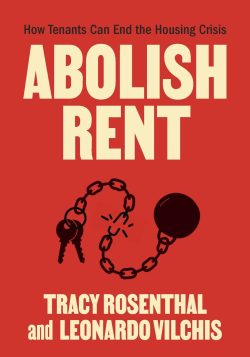Last year, two veterans of the Los Angeles Tenants Union (LATU) published a bold declaration of intent on behalf of all partisans in the fight for liberation from real estate parasitism. Abolish Rent, coauthored by Tracy Rosenthal and Leonardo Vilchis, begins by exposing the antagonism at the heart of the housing crisis: on the one hand, the financialized housing system and its various state expressions, and on the other, the tenants, whom the system mercilessly expropriates. In the course of this oppressive relation, as the authors demonstrate, the hegemonic financial apparatus bestows upon society a pervasive and composite malady that we might call “rent stress”—an antihuman corrosive (both physiological and emotional) endemic to the system of organized rent extraction. The text proceeds with a first-hand narrative of the resurgent movement against this outrage, signaling that our cities have not yet been surrendered as mere playgrounds for the rich.
Drawing from this account, the book makes some assertions about how to think through and act within the contemporary housing struggle; and it is here that the book makes its invaluable contribution to a discourse starved for strategic insights, and where movement developments have far outpaced their theoretical counterpart.
Before moving into the book’s argument and my critique, it is worth noting that Abolish Rent is not a theoretical or philosophical volume; it is an agitational and popular educational text. However, because it marks out strategic limits that have far-reaching consequences for the class struggle more generally, it invites a theoretical appraisal of its claims on these grounds.
In the critique that follows, I aim to: (1) demonstrate that Abolish Rent’s tenant-only strategy is too restrictive, and that the text may not have adequately theorized the nexus between the epoch and the conjuncture to arrive at this strategy; (2) suggest a Marxist conceptual framework, including a theory of hegemony, through which to rethink the conjuncture, its crisis points, and their relationship to the housing question; (3) propose that cross class discontentment toward parasitic finance capital represents both a key crisis point in the present conjuncture, and an opportunity to build working-class hegemony in practice; and (4) argue for a tenant-homeowner bloc, as part of a larger cross class coalition, capable of disrupting the hegemony of finance capital and waging a popular revolution.
The Tenant-Only Strategy of Abolish Rent
For Rosenthal and Vilchis, the increasing precariousness of tenants as a social class (now a majority in cities like Los Angeles) make them the principal locus in the struggle against rent, against the capitalist order in general (now waist-deep in real estate investments), and, ultimately, for communism—conceived of here as collective stewardship and sovereignty over land.1As Rosenthal and Vilchis write, “when housed and unhoused tenants practice collective stewardship of housing and of our public spaces, we wage an offensive against the claims of private landowners and the force of the state.” Tracy Rosenthal and Leonardo Vilchis, Abolish Rent (Chicago: Haymarket, 2024), 103. Earlier in the discussion, the authors argue that “collective sovereignty is an aspirational horizon.” Rosenthal and Vilchis, Abolish Rent, 102. In the narrative of the text, then, there are tenants at the beginning—once subordinate objects of oppression, now subjects capable of transforming their conditions—and there is land sovereignty at the end, toward which the tenants march.2Abolish Rent is riddled with references to tenant political subjectivity: “In our one-party city in our one-party state, we organize tenants as political subjects whose task it is to beat back the power of real estate and change the world”; “Tenants can be key political subjects, the architects of a long-term project of expropriation through which…hoarded wealth becomes shared by us all”; “Each rent strike develops the power of tenants as political subjects.” Rosenthal and Vilchis, Abolish Rent, 13, 35–36, 57. What connects these nodes is community-level self-organization (unfolding “block by block,” as the saying goes) whereby the capacity is built for something like a general rent strike, which, combined with the concurrent struggles of other abolitionist movements, finally overwhelms the forces of capital and its besieged state.3Rosenthal and Vilchis, Abolish Rent, 95. The strategy outlined here amounts to a war of attrition, leading to emancipation, with tenants at its center.4As Rosenthal and Vilchis characterize their own project: “Our task is to grow the power of our movement enough to make rent strikes general and—finally—permanent,” going on to write later, “if our goal is to abolish the power relation of rent, tenant organizing is our only road.” Rosenthal and Vilchis, Abolish Rent, 57, 77.
The theoretical basis for this strategy, however, remains unclear. Looking beyond the text, a piece authored by comrades of Vilchis and Rosenthal, fellow members of the School of Echoes (the organization which helped found LATU) gives a possible explanation for the tenant’s position in the authors’ theoretical system: “tenants are the new proletariat” in the present form of capitalism, which they identify as “the real estate conjuncture.”5School of Echoes Los Angeles, “La Comuna o Nada: Building an Autonomous Tenants Movement in Los Angeles,” Eurozine, May 20, 2020, https://www.eurozine.com/la-comuna-o-nada/. For the relationship between School of Echoes and LATU, see Abolish Rent. Rosenthal and Vilchis, Abolish Rent, 12. Editor’s note: An earlier version of the text neglected to include the explanatory gloss for the reference to twelfth page of Abolish Rent in this footnote. This mistake was solely the result of our editorial oversight—Joshua Nicholas Pineda. Beyond the provocative lede and an overview of finance capital’s role in disarticulating urban communities and proliferating this renter underclass, the theoretical ambiguity of the tenant’s position persists. The strategy of Abolish Rent, it seems, is a strategy lacking a defined theory. And to attribute this lack to the limited scope of the book (that is, the contours of the housing crisis), while partly justified, remains dissatisfying; this is a book that calls for communism and proposes a vision for achieving it.
There is a logical and empirical argument, though, operative in both the book and the School of Echoes article, upon which Rosenthal and Vilchis construct what we might consider the core component of their strategy: that of the tenant-as-subject. According to this argument, tenants have learned that they are alone in their struggle; that other class forces and social strata are not to be trusted in the fight against the landlord. Various actors are named: homeowners, nonprofits, mom and pop landlords. (Small businesses, who pay exorbitant leases themselves, and whose fate is equally contingent upon the mega movements of capital, are not mentioned.) While all of these categories deserve their own treatment, we will restrict our focus to homeowners, where the assumed barrier with tenants is, I think, the most questionable.
Homeowners, for Rosenthal and Vilchis, are structurally invested in the circuits of capital that obliterate tenants. They are the beneficiaries of a “bifurcated” housing system, originally “cemented” in Roosevelt’s New Deal (cheap postwar loan programs, redlining, and racial covenants) and continued through extensive federal subsidies and tax breaks. Their investment in property values aligns homeowners with real estate capital, and against tenants.6Rosenthal and Vilchis, Abolish Rent, 27, 40. This perspective is consistent throughout much of the sections detailing the conjuncture in Abolish Rent. To quote extensively: “The war on tenants has rigged the American housing system to benefit homeowners, landlords, and real estate speculators at the expense of tenants’ human needs”; “Unlike landlords, developers, and homeowners, tenants want and need rents—thus property values—to fall”; “Like individual homeowners, cities were disciplined by creditors and compelled to enact policies in line with business and real estate interests”; “US housing policy has privileged homeowners over tenants, and private, asset-based wealth over a social wage”; And most decisively: “Suburban homeowners traded public transit, parks, and social support for private cars, yards, and property values. They evacuated cities of resources by withdrawing from urban tax bases, even as they continued to depend on the same cities for jobs and infrastructure. They were recruited into alignment with the real estate regime: private asset inflation over public good.” Rosenthal and Vilchis, Abolish Rent, 35, 38, 44, 47, 74. Rosenthal and Vilchis take to heart economist Homer Hoyt’s axiom, quoted in the book: “Communism can never win in a nation of homeowners.”7Rosenthal and Vilchis, Abolish Rent, 40. The cavalier statement suggests an implacable conservatism lurking behind every white picket fence.
In light of such observations, the aforementioned middle sectors are excluded from strategic considerations; they are, effectively, a lost cause, bonded to the cold comforts of material interest.
A Theoretical Gap
Where does this leave us, then, in terms of the book’s overall theoretico-strategic framework? It will be agreeable enough, among socialists, that the ends proposed—the seizure and collectivization of all possible footholds for private capital accumulation—amount to the general definition of communism. It will also be agreed that tenants, by and large, necessarily comprise an inner circle of forces in the struggle against the rentier class, for all the reasons given in the text. However, the authors go further than this: for them, tenant subjectivity subsumes the strategic field. And without recourse to a conceptual system that justifies this move (and that situates it within a general notion of revolutionary subjectivity) we are left with a theoretical lacuna, unable to orient a strategy around foundational presuppositions.
A consequence of this aporia is that, between our present and our horizon, the intermediate space of politics is foreclosed in a kind of short-circuit; either left to some Other to philosophize, or assumed to be a relatively straightforward affair (if necessarily marked by the euphoric advances and painful setbacks one would expect in the course of any class struggle). Implicit in such a framework is the understanding that politics will be done in the meantime, but done by someone else. In other words, tenant leadership within society proper is postponed; for now, bourgeois administrators will be compelled to pass state reforms as the movement gains strength, until an imagined point of total rupture from which the capitalist state cannot recover.8“This is a strategic orientation that…is neither state-phobic nor state-philic. It views the state as a terrain where resources are often more available to our enemies than to us, but one that we can—and we must—constrain to our will. It understands the history of reforms as concessions to revolutionary social movements and liberation as a project beyond rights, which achieves rights in its wake.” Rosenthal and Vilchis, Abolish Rent, 103, emphasis added. Of course, this is too hopeful. And the vast, undertheorized space of politics continues to haunt the tenants movement, as it collides again and again with the unavoidable questions of alliances and of the imminent social crises that cannot be reconciled to the abstract horizons posited in the book.


